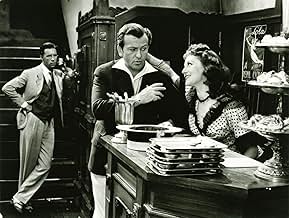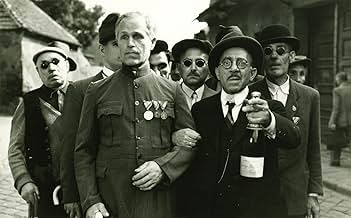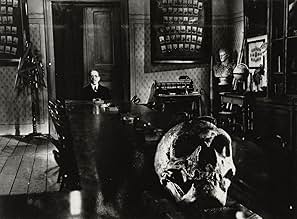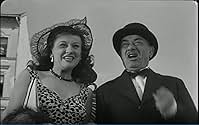अपनी भाषा में प्लॉट जोड़ेंWhen a Latin teacher publishes an essay on the Carthaginian General Hannibal, he is quickly hailed as a celebrity genius, but in reality has become an unwitting pawn of far-right politicians... सभी पढ़ेंWhen a Latin teacher publishes an essay on the Carthaginian General Hannibal, he is quickly hailed as a celebrity genius, but in reality has become an unwitting pawn of far-right politicians.When a Latin teacher publishes an essay on the Carthaginian General Hannibal, he is quickly hailed as a celebrity genius, but in reality has become an unwitting pawn of far-right politicians.
- पुरस्कार
- कुल 1 नामांकन
Ernö Szabó
- Nyúl Béla
- (as Szabó Ernõ)
फ़ीचर्ड समीक्षाएं
An important film on Fascism and mob psychology, with a visually fascinating and well-edited final 20 minutes.
This astonishing film combines satire, comedy and tragedy and is the work of Zoltan Fabri, one of the first post-war directors to make a mark outside his native Hungary.
It concerns a shy, good natured Professor with a devoted wife and three adorable children who teaches at a local school. He becomes a celebrity after writing a treatise on Hannibal and the Punic Wars in which he maintains that Hannibal was not poisoned as is commonly accepted but died as a result of a revolution in his homeland. Alas the Professor soon goes from Hero to Zero as extreme right-wing politicians seize on this as an incitement to dissent and rebellion. He is even accused of being a Communist agitator and because of his refusal to recant he is sacked. Through the machinations of a fascist demagogue and the fickleness of the mob he is restored to Hero status but sadly too late to save him. Fabri's mise-en-scene has touches of genius that reveals a mastery of the visual with beautifully drawn characters. Erno Szabo is unforgettable as the unwitting political pawn and there is great support from Zoltan Greguss as a larger-than-life fascist big wig and Noemi Apor as a coquette who finds it impossible to be monogamous. Set in Budapest in the 1930's during the rule of the fascist Admiral Horthy, it is supremely ironic that within days of the films release in 1956 the Hungarian uprising began which made it even more relevant.
Fabri has reminded us, in the same way that Duvivier in 'Panique' and Lang in 'Fury' have done, of the evils of rabble-rousing and mob psychology and that the decent individual cannot withstand the force of the unthinking mass.
This is the story of a shool teacher who becomes a mementary hero after having rescued a stuffed-bird from a school incident! In esence, he is the prototype of the small and insignificant man and this fact is to be generalized even by his name(Nyul - meaning "rabbit"- Bela).When he sees his name wriiten on the walls as all insignificants spiritual leader, who must go, we know there`s no way out for him, but the inevitable death!Heartbreaking and sad, but so real, in the same time!Don`t miss it!
Hannibal Tanár Úr is a Hungarian black-and-white film from 1956 by Zoltán Fábri. Despite its age and technical obsolescence, I would describe this film as monumental. It tells the story of a gentle, educated Latin teacher who, as a result of an academic treatise on the death of the Carthaginian leader Hannibal, unwittingly becomes a victim of a power struggle between politicians. The theme is timeless, and all the human characteristics of that time are still relevant today: vanity, opportunism, hunger for power, unreliability, and manipulability. Fabri brings it to life in breathtaking fashion; the pace of the film is slower than that of contemporary films, but that gives the viewer more time to enjoy the highly interesting backdrop of pre-war Hungary. The clothing, furnishings, fascist-style uniforms, houses, and streetscape form a setting that holds the viewer's attention even without a story. The strong and sympathetic acting is the crowning glory of this film; the viewer is drawn into the story and remains fascinated until the bitter end. This film was made in the 1950s, when the artistic climate in Hungary could be described as repressive, to say the least, and it is something of a miracle that masterpieces such as this could be made at that time. The fact that it was the pre-war regime rather than the regime of the time that was satirized will certainly have contributed to its realization, but the film's message is more universal.
क्या आपको पता है
- ट्रिवियाVoted as one of the "12 Best Hungarian Films 1948-1968" by Hungarian filmmakers and critics ("Budapest 12") in 1969 and then again as one of the "12 Best Hungarian Films" ("New Budapest 12") in 2000.
- कनेक्शनFeatured in Fejezetek a film történetéböl: A magyar film 1945-1957 (1990)
टॉप पसंद
रेटिंग देने के लिए साइन-इन करें और वैयक्तिकृत सुझावों के लिए वॉचलिस्ट करें
विवरण
- चलने की अवधि
- 1 घं 29 मि(89 min)
- रंग
- ध्वनि मिश्रण
- पक्ष अनुपात
- 1.37 : 1
इस पेज में योगदान दें
किसी बदलाव का सुझाव दें या अनुपलब्ध कॉन्टेंट जोड़ें
























